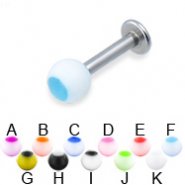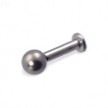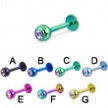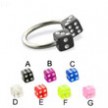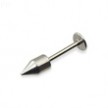Panda ball labret, 12 ga
- Gauge (Thickness): 12 (2.0mm)
- Material: 316L surgical grade stainless steel
- Material: acrylic
- Type: labret
Shown: 10mm labret with 6mm ball.
| Click on the picture to see a big picture and description of the body jewelry you are interested in. | |||||||||
|---|---|---|---|---|---|---|---|---|---|
|
Titanium labret, 10 ga
$8.99
Titanium labret, 10 ga
|
Titanium anodized jeweled labret, 16 ga
$7.75
Titanium anodized jeweled labret, 16 ga
|
Circular horseshoe barbell with acrylic dice,...
$6.99
Circular horseshoe barbell with acrylic dice, 16 ga
|
Labret with spike, 16 ga
$4.49
Labret with spike, 16 ga
Shown: 10mm labret with 4mm spike. |
||||||
TREATING FACIAL PIERCINGS
The piercing is susceptible to infection while it is healing. Appropriate aftercare is important to reduce the risk of infection.
Wash your hands thoroughly with antibacterial soap before touching your piercing or jewelry.
The piercing should be cleaned twice a day while it is healing. Over-cleaning can irritate the piercing; do not clean more often unless the piercing has been exposed to dirt, sweat, or bodily fluids. Saline solution may be used to remove dried discharge between cleanings.
Antiseptics containing benzalkonium or benzethonium chloride are often suggested for cleaning ear and facial piercings. The disinfectant should be applied to both entrances and allowed to saturate the inside of the piercing by rotating the jewelry. Remove any dried discharge from the jewelry using a cottonswab and hot water before rotating the jewelry; do not use your fingernails. If the skin around the piercing becomes red, dry and chapped rinse the area with water after cleaning or discontinue use and switch to a regimen of antibacterial soap.
Liquid antibacterial soaps are preferred by some piercers. The shower provides the best place to adequately lather and rinse piercings. After washing and rinsing your hands apply the soap lather around and on your piercing while rotating the jewelry. Remove any dried discharge from the jewelry using a cottonswab and hot water before rotating the jewelry; do not use your fingernails. Allow the lather saturate the piercing for 3 minutes. Rinse your piercing, jewelry and the surrounding area thoroughly under running water. While rinsing rotate the jewelry several times. Do not use a washcloth or sponge to clean your piercing. Cloths and sponges trap and collect bacteria and mildew. For this reason, use a tissue or paper towel to dry your piercing after you clean it.
Rinse your piercing and jewelry thoroughly with water after showering or bathing.
Do not allow your piercing to come in contact with cosmetics, lotions, and perfumes which can cause extreme irritation. When using har spray cover your piercings with your hand or a tissue.
The most frequent causes of infection are touching the piercing or the jewelry with unwashed hands or contact with unclean items such as clothing, bedding or hair. Do not wear hatbands or bandannas over ear and eyebrow piercings. In the case of ear piercings use the opposite ear for telephones or place a clean tissue between the ear and the receiver.
Do not allow your piercing to come into contact with saliva (of others and your own) or another person's bodily fluids.
Swimming in public pools, spas and hot-tubs is advised against as one can never be sure of the quality of sanitation and the risk of exposure to bacteria is too great. Although some people have experienced no ill-effects from swimming in ocean / sea water most piercers maintain that the risks of exposure to unhealthy elements outweighs any benefits the salt water may have.
Laundry detergents containing stain-fighting enzymes should not be used.
The enzymes can destroy epithelial (healing) cells and delay healing.
After the healing process is complete you should continue to clean your piercing once a day as part of your bathing or showering routine to prevent accumulation of dirt and dead skin cells.
